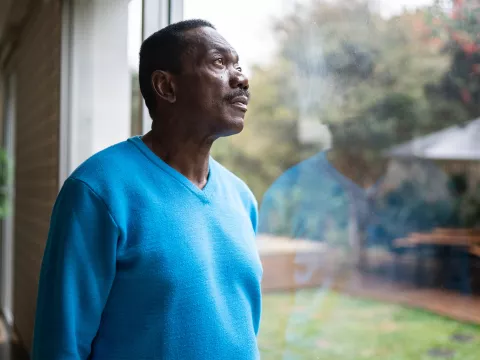- AdventHealth

Choose the health content that’s right for you, and get it delivered right in your inbox.
The stigma that still surrounds mental health conditions prevents many individuals from seeking help when they need it most. When one is part of a minority group, those stigmas can be even more difficult to overcome.
We’re here to help break those barriers and talk about how our Black communities in particular are affected when it comes to mental health conditions and stereotypes. Help is around the corner and should be sought out whether the condition is mental or physical. Body, mind and spirit work together to form our whole health. When one is suffering, the others are affected.
Challenges with Mental Health Care
Only one in three Black adults who need mental health care receive it. While they are more likely than Caucasian adult to report emotional distress, they report it more as physical symptoms such as back pain or headaches. They are less likely to receive consistent care, not frequently included in studies and are more likely to use emergency departments and primary care rather than going to a mental health specialist for help.
While primary care is a great place to start, it’s important to get specialized care when needed, and as soon as possible after the symptoms begin. Those who live below the poverty line are more than twice as likely to report severe emotional distress than those who are financially secure.
Barriers to Be Broken
Not only do Black Americans seek professional help less frequently, they are faced with barriers to it. Like other minorities, socioeconomic factors make treatment harder to come by with not as much access to important health and educational resources. This can lead to poorer mental health outcomes.
Since there are often untrue stereotypes about people who have mental health conditions, minorities may experience more anxiety about having a mental health condition, worrying they will be discriminated against for that reason. It makes it all the more difficult for our Black communities to discuss mental health.
We want you to know that it’s okay to have a mental health condition, discuss it and seek help for it.
Care You Can Trust Across Cultures
A person with mental health challenges needs consistent, quality care to get better. At AdventHealth, we provide world-class care to everyone and treat every patient with dignity. We honor all cultures, respect all wishes and strive to meet all needs. We build trusting relationships between patients and providers and Extend the Healing Ministry of Christ to them and their families. If you’re suffering, visit here and reach out for care from the heart that you can trust. You are whole and deserve to feel well in body, mind and spirit.



